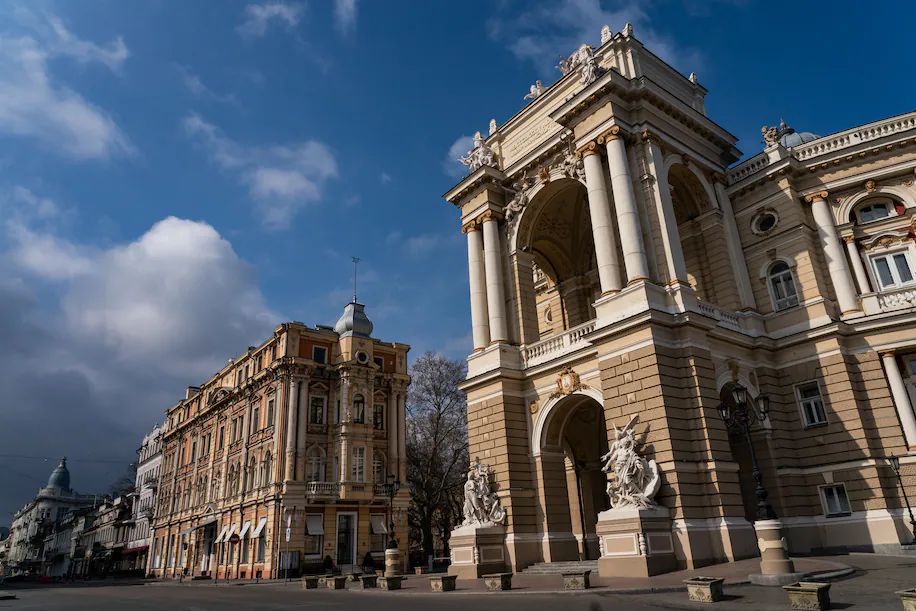March 17, 2022

ODESSA, Ukraine — The barricades blocking the path to the Odessa Opera and Ballet begin three blocks away. Two more walls like that further protect the entrance. Antitank hedgehogs — metal rods welded together in a cluster — fill the spaces between the cordons.
It’s a scene out of World War II — literally. This famed Black Sea port used the same fortification in 1941, ahead of a Nazi siege. The Soviet Union’s Red Army posted antiaircraft units on the roofs of buildings around the theater to protect it from bombing.
More than 80 years later, preparing for a potential Russian assault on Odessa, the theater is again the most fortified building in town. It’s the city’s most iconic landmark — the one most often printed on postcards — and a symbol of Odessa’s rich history, dating to when it was the crown jewel of Imperial Russia.
The sandbags and hedgehogs wouldn’t protect the theater from a direct strike — the current building dates to 1887, making it Ukraine’s oldest opera house. But the reinforcements are a statement to Odessans and the Russian military that this city’s ornate architectural gem is not to be harmed.

As Odessa braces for a Russian invasion, local musicians staged an impromptu concert in front of the city’s iconic opera and ballet theater. (Whitney Leaming, Lindsey Sitz/The Washington Post)
“We cherish the theater because it’s beautiful,” said theater director Nadezhda Babich. “It deserves to be treated like a living creature. This is the heart of Odessa.”
Ukrainians across the country are mourning not just the loss of life in this war but also the loss of cultural heritage in places such as Kharkiv — Ukraine’s second-largest city, founded in the 1600s. Russian bombardments have turned some historic downtown buildings into rubble. Its opera and ballet theater is one of the more than 600 structures that have been damaged.
Videos verified by The Washington Post on Wednesday showed extensive damage to the Drama Theater in Mariupol, the eastern Ukrainian city on the Azov Sea that has seen some of the heaviest fighting of the war. The theater had been used as a shelter for hundreds of displaced people. It was unclear whether there were casualties from the explosion.
Odessans fear their theater could be next.
Babich called it “a strategic object,” saying that “it’s no secret that it’s one of the best theaters in Europe, in excellent condition.” Even she has to get special permission from the military to go inside.
The Culture Ministry instructed her to evacuate anything valuable, she said, but that was impossible. The walls and ceiling are gilded with gold, in rich contrast with the red velvet seats, which can accommodate more than 1,600 people.
Like other old buildings around the city, the exterior is in the Italian baroque style. But the details are drawn from Greek mythology — an ode to the ancient Greek settlement that was here long before Catherine the Great founded this city in the late 1700s.

Catherine was Russian, but her monument downtown is now draped with a Ukrainian flag.
“We value our Potemkin Stairs and other heritage architecture, which is in the heart of every Odessa citizen,” Mayor Gennadiy Trukhanov said. “And we are worried that some scoundrel might dare to push that button and shoot a missile at the opera theater.”
Except for some shelling on the outskirts of the city, Odessa has been largely spared during the first three weeks of the war. Locals have traded rumors about why. Some believe it’s because of this city’s historical importance to the Russian Empire, a period Russian President Vladimir Putin romanticized ahead of ordering the invasion. Others have speculated that Russians have so much adoration for this place that soldiers mutinied and refused to bombard it. There is no evidence to support either theory.
Russian warships are posted near the city’s Black Sea shoreline, but military analysts said they are unlikely to try an amphibious assault without ground support from Russia’s forces in the east. That advance has stalled at the edge of Mykolaiv, about 80 miles away, apparently hindering Moscow’s attack plans for Odessa.
